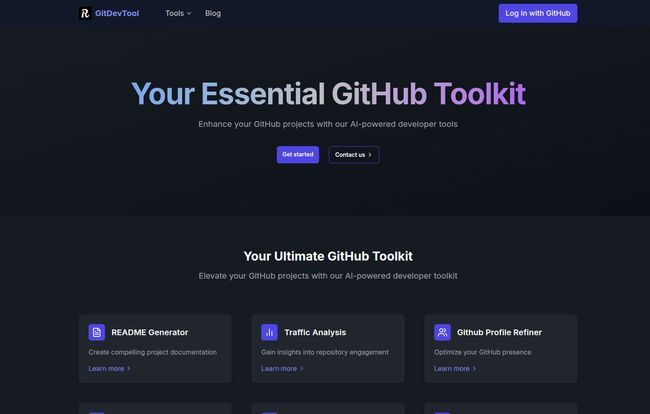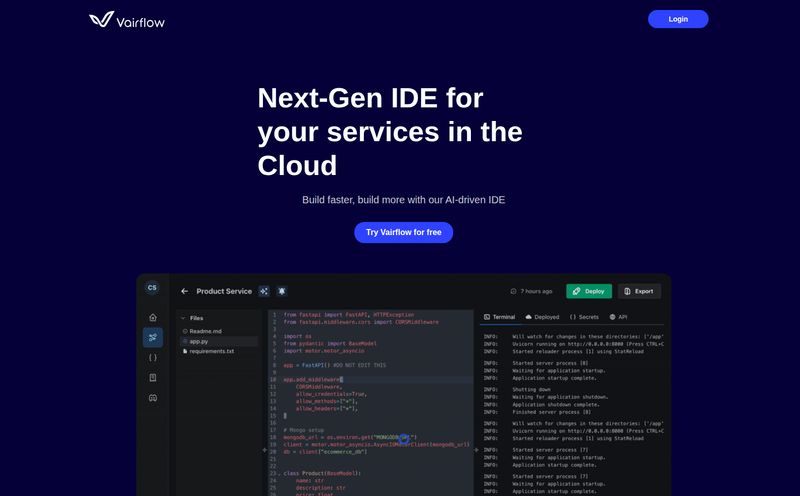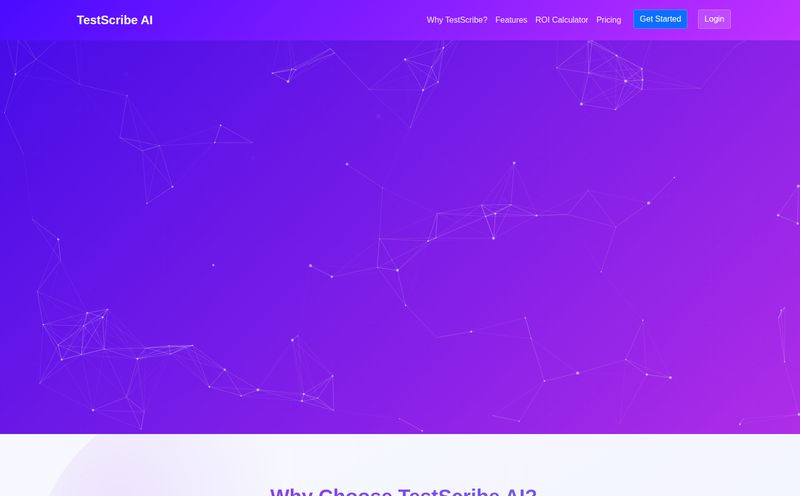We all love GitHub. It’s our digital workshop, our portfolio, and sometimes, our biggest headache. Between writing clean code, wrestling with Git commands that feel like ancient incantations, and trying to make our project's README look like more than just a hastily written note—it's a lot. I’ve spent more nights than I’d care to admit trying to get a project ready for the public eye, and most of that time wasn't even spent coding.
So when a new tool pops up promising to be my “Essential GitHub Toolkit,” powered by AI no less, my ears perk up. But so does my skepticism. We've seen a million 'productivity-boosting' apps. I decided to take a proper look at GitDevTool to see if it’s the real deal or just another shiny object in the ever-expanding universe of dev tools.
So, What is GitDevTool Anyway?
At its core, GitDevTool is a collection of utilities designed to live right alongside your GitHub workflow. Think of it less as a single-purpose tool and more like a utility belt for the modern developer. It’s not trying to reinvent the wheel; it’s trying to grease it. The whole idea is to use AI to automate or simplify the tedious tasks that orbit our actual code: documentation, project analysis, promotion, and even just remembering that one obscure Git command.
It brings together a bunch of features that I've previously used separate apps for. And the thought of having them all in one spot is, admittedly, pretty appealing. Less tab-switching is always a win in my book.
A Look Inside the Toolkit: The Features That Matter
Okay, let's get into the meat and potatoes. A toolkit is only as good as the tools inside it. GitDevTool has a surprisingly wide array of offerings.

Visit GitDevTool
The AI README Generator That Doesn't Suck?
This was the first thing that caught my eye. Writing a good README is an art form. It's the front door to your project, and a bad one can scare people away faster than a missing semicolon in JavaScript. GitDevTool’s generator promises to create “competing project documentation.” A bold claim. In my experience, AI text generators can be a bit… robotic. But for scaffolding out the basic sections—Installation, Usage, Contributing—and getting past that initial blank-page paralysis? This could be a lifesaver. I see it as a powerful starting point, not a one-click final product.
Understanding Your Repo with Traffic Analysis
GitHub’s built-in traffic insights are okay, but they’ve always felt a bit basic. GitDevTool offers a dedicated Traffic Analysis feature to give you deeper insights into repository engagement. For anyone maintaining an open-source project or using GitHub as a marketing channel (which you absolutely should be), this is huge. Knowing who is looking at your project and where they're coming from helps you understand your audience. It turns your repo from a code dump into an actual, measurable asset.
The GitHub Profile Refiner
Your GitHub profile is your new resume. I’ve said it for years, and I’ll stand by it. Recruiters and hiring managers are all over it. The Profile Refiner aims to help you “Optimize your GitHub presence.” I’m picturing suggestions on popular repos to pin, contribution graph analysis, and maybe even tips for a better bio. It’s a small thing, but in a competitive job market, a polished profile can definately make a difference.
The Grab-Bag of Other Goodies
Beyond the big three, there are several other tools that deserve a mention:
- Git Command Helper: For when you're staring at your terminal, about to do something destructive with `git reset --hard` and need a safer alternative. A searchable, plain-English guide to Git is something every developer needs from time to time.
- Code Snippet Sharing: We all share snippets on Slack, Discord or Twitter. Making them look pretty is half the battle. This feels like a nice quality-of-life improvement.
- Social Media & HackerNews Tools: This is for the indie hackers and open-source folks. Promoting your work is tough. Tools that help you find the right place to post on HackerNews or format a shareable post for social media can lower that barrier to entry. It's the stuff nobody tells you about when you start a project.
- Repo2LLM Converter: Now this is interesting. It converts a repo to LLM input. My mind immediately goes to feeding project-specific context into a local LLM for Q&A, or creating fine-tuning datasets. It's a niche feature, but a very forward-thinking one.
The Real-World Experience: Pros and Potential Pitfalls
No tool is perfect. Let's talk about the good and the, well, things to be aware of. The biggest advantage is having all these connected tools in one place. The synergy is obvious—refine your README, then use the social sharing tool to promote it, and then check the traffic analysis to see the impact. It's a cohesive workflow.
However, the platform's effectiveness hinges entirely on the quality of its AI. If the suggestions are generic or the generated text is clunky, the value proposition falls apart pretty quickly. It's an assistant, not a replacement for your own brain.
Another thing is the “Log in with GitHub” requirement. It’s standard practice, but some developers are (rightfully) cautious about granting permissions to their accounts. You'll want to check exactly what permissions it's asking for. For me, the convenience usually outweighs the risk, as long as the scopes are reasonable.
What's the Price of Entry?
This is the big question, isn't it? I scoured the homepage, and there’s no pricing page in sight. The main calls to action are “Get Started” and “Start optimizing now.” This usually means one of two things: the tool is in a free beta phase to gather users and feedback, or it operates on a freemium model where you log in to see the tiers. My guess is the latter. I expect a generous free tier for basic use, with paid plans unlocking more advanced features or higher usage limits. For now, it seems like you can jump in and try it without pulling out your credit card.
Who Should Give GitDevTool a Shot?
I don't think this is for everyone. If you're a developer at a massive corporation with a locked-down, self-hosted GitLab instance, this probably isn't for you. But if you're one of the following, I'd say it's absolutely worth a look:
- Open-Source Maintainers: The documentation and promotion tools alone could be a massive time-saver.
- Indie Hackers & Solopreneurs: You have to be a coder, marketer, and support agent all in one. Anything that streamlines that process is pure gold.
- Job-Seeking Developers: Use the Profile Refiner and README Generator to make your public work shine. It’s a small investment of time that could pay off big.
- Students & New Coders: The Git Command Helper and documentation tools can help build good habits from the start.
Frequently Asked Questions
Is GitDevTool free?
The website doesn't show a public pricing page, but the "Get Started" button implies there's likely a free tier or a free trial available. You'll probably need to sign up with your GitHub account to see the full pricing structure.
Does GitDevTool need access to my private code?
This is a critical question. When you authorize any app via GitHub, it will show you a list of permissions it's requesting. You should always review this carefully. A tool like this would likely need read-access to analyze repos, but you should verify if it asks for write-access or access to private repos before you proceed.
How good is the AI README Generator, really?
Think of it as a smart assistant. It's unlikely to write a perfect, personality-filled README from scratch. However, it should be excellent for creating a solid structure, writing boilerplate sections, and ensuring you haven't forgotten anything important. You'll still need to add your own personal touch.
Can this tool replace learning Git?
Absolutely not. The Git Command Helper is a fantastic supplement and a safety net, but it's not a substitute for understanding the fundamentals of version control. Use it to find the right command, not to avoid learning why that command works.
What's a practical use for the Repo2LLM Converter?
Imagine you have a complex project. You could use this tool to package the entire codebase into a format that you can feed to a large language model like ChatGPT or a local Llama model. You could then ask the AI questions about your own code, like "Where is the database connection logic defined?" or "Can you explain this function to me?" It's a powerful way to create a project-specific expert.
Final Thoughts: Is It a Must-Have?
So, what's the final verdict? I'm genuinely optimistic about GitDevTool. It's addressing real, tangible pain points that developers face every single day. The focus isn’t on some abstract, far-off promise of AI, but on practical applications that save time and reduce friction. It's a cohesive package that understands a developer's workflow beyond just writing code.
Is it a must-have? Maybe not for everyone, but it’s dangerously close to being a must-try. If you’re an indie dev, an open-source contributor, or just someone looking to level up their GitHub game, I think you owe it to yourself to hit that “Get Started” button and see what it can do. It might just be the sidekick you've been looking for.
Reference and Sources
- GitDevTool Official Website
- makeareadme.com - A great resource for understanding the principles of a good README.
- Hacker News - The community GitDevTool aims to help you engage with.



